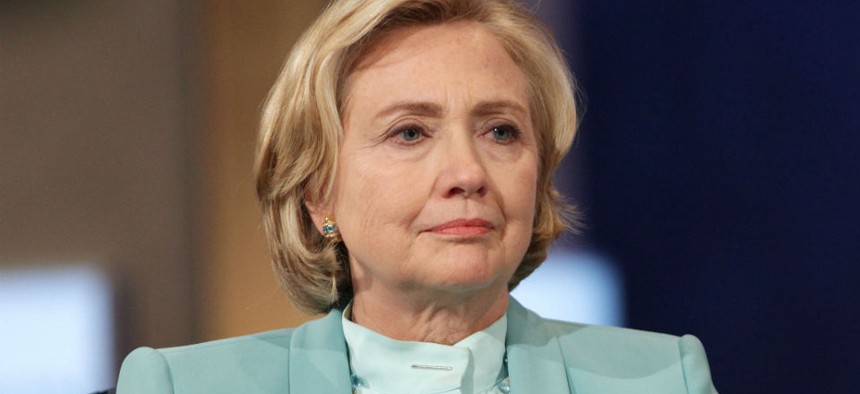
JStone/Shutterstock.com
19 Days After Michael Brown's Shooting, Hillary Clinton Weighs In on Ferguson
"Behind the dramatic, terrible pictures on television are deep challenges that will be with them and with us long after the cameras move on," she says.
Nearly three weeks after the death of Michael Brown, a black 18-year-old who was shot by a white police officer in Ferguson, Mo., Hillary Clinton weighed in on the unrest in Missouri and, more broadly, the state of racism in America.
Speaking at the software company Nexenta in San Francisco on Thursday, Clinton finally broke her silence to offer a fairly mild take on the events in Ferguson.
Some had called for Clinton—a possible presidential contender in 2016—to weigh in on Ferguson, while others, like The Washington Post's Paul Waldman, deemed her input unnecessary. The Rev. Al Sharpton, who has been perhaps the most vocal national voice on Brown's death, had repeatedly called on Clinton to comment. "Why has Hillary Clinton been silent on Ferguson?" asked a CNN panel. On Sunday, reporters shouted questions about Ferguson to Clinton as she was leaving a book signing in Westhampton Beach, N.Y. Clinton ignored them.
Here are Clinton's full remarks on Ferguson from Thursday:
This summer, the eyes of our country and indeed the world have been focused on one community in the middle of the American heartland: Ferguson, Missouri.
Watching the recent funeral for Michael Brown, as a mother, as a human being, my heart just broke for his family, because losing a child is every parent's greatest fear and an unimaginable loss.
But I also grieve for that community and for many like it across our country. Behind the dramatic, terrible pictures on television are deep challenges that will be with them and with us long after the cameras move on. This is what happens when the bonds of trust and respect that hold any community together fray. Nobody wants to see our streets look like a war zone, not in America. We are better than that.
We saw our country's true character in the community leaders who came out to protest peacefully and worked to restrain violence; the young people who insisted on having their voices heard; and in the many decent and respectful law enforcement officers who showed what quality law enforcement looks like—men and women who serve and protect their communities with courage and professionalism, who inspire trust, rather than fear. We need more of that, because we can do better. We cannot ignore the inequities that persist in our justice system, inequities that undermine our most deeply held values of fairness and equality.
Imagine what we would feel and what we would do if white drivers were three times as likely to be searched by police during a traffic stop as black drivers, instead of the other way around. If white offenders received prison sentences 10 percent longer than black offenders for the same crimes. If a third of all white men—just look at this room and take one-third—went to prison during their lifetime. Imagine that. That is the reality in the lives of so many of our fellow Americans and so many of the communities in which they live.
I applaud President Obama for sending the attorney general to Ferguson and demanding a thorough and speedy investigation. That's both appropriate and necessary to find out what happened, to see that justice is done, to help this community begin healing itself. And we should all add our voices to those that have come together in recent days to work for peace, justice and reconciliation, in Ferguson and beyond, to stand against violence and for the values that we cherish. We can do better. We can work to rebuild the bonds of trust from the ground up. It starts within families and communities.
It was 51 years ago today that Dr. Martin Luther King Jr. called us to live out true meaning of our creed, to make the dream real for all Americans. And that mission is as fiercely urgent today as when he stood on the steps of the Lincoln Memorial in the hot August sun, all those years ago.
So we have a lot of work to do together. At Nexenta, you say, "Better living for a better world." At the Clinton Foundation, we say, "We're all in this together." If you put those together, it comes out to a pretty good road map for the future. And we need all of you, your energy and your efforts, your innovation, your building, your creating to help us achieve that better world. Thank you all for having me here with you today.
As more public officials slowly weigh in on Ferguson, details of Brown's death remain unclear. Last week, a grand jury began hearing testimony in the case, which could go through October. On Monday, CNN aired an audio recording that allegedly captured the sounds of police officer Darren Wilson shooting Brown to death.
(Image via JStone/Shutterstock.com)







